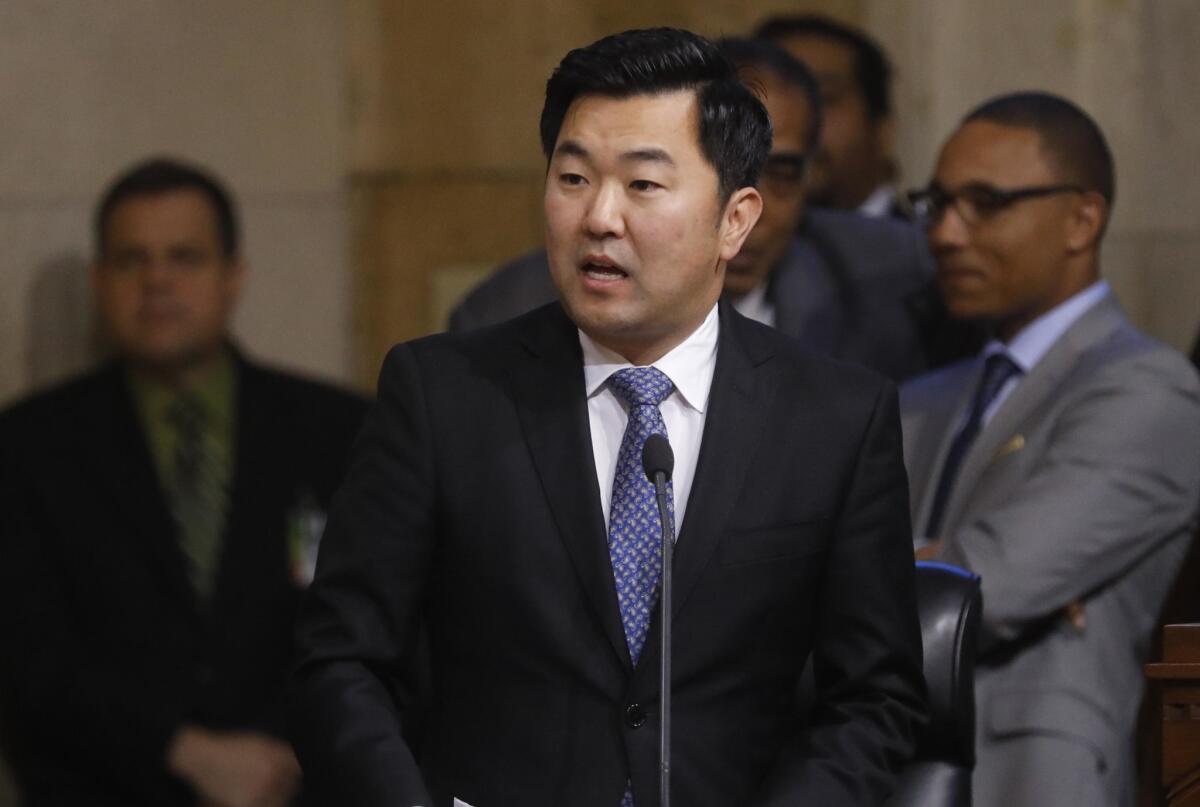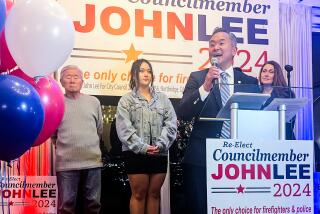An L.A. councilman swore off developer money. Rivals argue he’s broken that promise

- Share via
When David Ryu first ran for Los Angeles City Council, he swore off campaign money from real estate developers with L.A. projects, a move that became a selling point for him as a City Hall outsider.
Now, as Ryu runs for reelection, he has again pledged to steer clear of such donations. But some of his opponents argue that Ryu, who has already raised more than $780,000 for his campaign, has broken that promise.
Among the dozens of donations that his rivals have called into question are those from companies linked to Dae Yong Lee, who until recently was seeking to overhaul a Little Tokyo mall; a real estate investment company called First Serrano Apartment LLC; and the head of a Beverly Hills company specializing in commercial property.
“David Ryu claims he doesn’t take developer money — even going so far as to make it look like he’s leading the charge against developer money — but campaign finance records show he’s continued raising huge sums of developer dollars this whole time,” said screenwriter Sarah Kate Levy, who is running against Ryu. “He’s not doing what he said he would.”
Ryu, who has pushed to clamp down on developer donations at City Hall, said his campaign was adhering to his pledge but that some contributions had escaped its notice. After getting questions from The Times, his campaign said it would refund a dozen donations, including those from the Beverly Hills company head, First Serrano Apartment LLC, and two companies linked to Dae Yong Lee.
“This is a lot more difficult than it seems,” Ryu said. “I welcome anybody and everybody from the press and the community to help me identify any errors.”
Donors who give to Ryu are asked to confirm that they don’t have an “active development” in L.A. or are seeking permits or approval for any development in the city. But city records make it difficult to tell if someone has an active project, “so vetting large numbers of contributions will almost certainly result in some errors,” said Ryu deputy campaign manager Daniel Eyal.
Ryu is not returning all of the donations scrutinized by his critics: Other questioned donors are architects, consultants or others sometimes hired to work on development projects, not developers as Ryu and his campaign have defined them, Eyal said.
For instance, Eyal said they had accepted contributions from attorneys Charles Lew and Isaiah Artest — whose firm represents the Flaunt Hotel, soon to break ground in Hollywood — because neither is “the primary applicant for, nor an investor in, the hotel.”
And the campaign has also accepted contributions from developers who do work outside of L.A. Under the pledge, the councilman does not accept donations from developers with “active projects” in L.A. or who “regularly pursue projects” in the city, Eyal said.
Levy argued that was inadequate, saying that “if you are a developer who has done business anywhere in California, it is only a matter of time before you will be at Los Angeles City Hall filing plans for a development project.”
Another rival candidate, Nithya Raman, who until recently headed the women’s rights group Time’s Up Entertainment, argued that Ryu had clearly broken his pledge. The candidate said that as she reviewed Ryu’s campaign donations, she was “struck by how much was coming from the real estate industry.”
“Not just developers: real estate lawyers, brokers, construction firms, real estate agents, corporate landlords,” Raman said in a statement. “What’s the point of a pledge to not take money from a few developers if the real estate industry, including many developers, is still propping you up?”
In reaction to such criticisms, Ryu said his campaign had tried to draw a clear and easily understood line, modeled on existing laws that bar donations from local lobbyists and city contractors.
“There’s no perfect system,” he said. “What we’re trying to do is probably more comprehensive than what the city is going to do.”
The debate is complicated by the fact that there is no agreed definition of “developer.” Ryu has publicly pushed to restrict developer donations at City Hall — an idea that had gotten tentative backing from the council — but officials are still wrestling with who exactly should be covered by a proposed ban targeting developers pursuing L.A. projects.
A council committee is scheduled to take up two version of the proposal Friday.
One version, recommended by the Ethics Commission, would bar donations from any applicant for an L.A. development project and its “principals” — including property owners, members of the project team, and subcontractors expected to make at least $100,000 on the project, among others.
Another version, based on a proposal from Ryu, would impose a somewhat narrower set of restrictions, barring political donations from applicants, owners and their principals — including company executives, representatives and people with at least a 20% ownership stake — seeking “significant planning entitlements.”
Both of the proposed bans would take effect once an application for a development is turned in to the city and would extend a year after the city makes a final decision. Eyal said that if those reforms pass, it would become much easier to track prohibited donations, since the city would keep an official list of “restricted developers” on hand.
Ryu is campaigning to hold on to his seat in the sprawling District 4, which stretches from Sherman Oaks through the Hollywood Hills to the Miracle Mile. When he first ran for office, questions about the political sway of real estate developers loomed large as residents at local forums railed against out-of-scale development.
This time, Ryu is facing challengers who have put housing and homelessness at the center of their campaigns, including Raman, Levy and Susan Collins, a real estate agent who argues that L.A.’s “housing first” approach to homelessness is inadequate.
They have made pledges surrounding developer donations as well: Levy will not accept contributions from “for-profit developers who have not shown a commitment to building affordable housing” in California, while Raman said she was avoiding donations from “people involved in the real estate industry in Los Angeles.”
Collins said she was forgoing contributions from “large development corporations.”
Levy, however, said she would not support the proposed ban on developer donations at City Hall, arguing that it would only push that money into independent expenditure committees that have “far less accountability and transparency.”
Raman said she backed the version of the proposed ban recommended by the Ethics Commission and wants to reduce the discretion that council members have over building approvals so that developers don’t have an “incentive” to get involved in council elections. Collins also said she supported clamping down on developer donations.
“We should do everything possible to get money out of politics,” Collins said.
More to Read
Sign up for Essential California
The most important California stories and recommendations in your inbox every morning.
You may occasionally receive promotional content from the Los Angeles Times.











